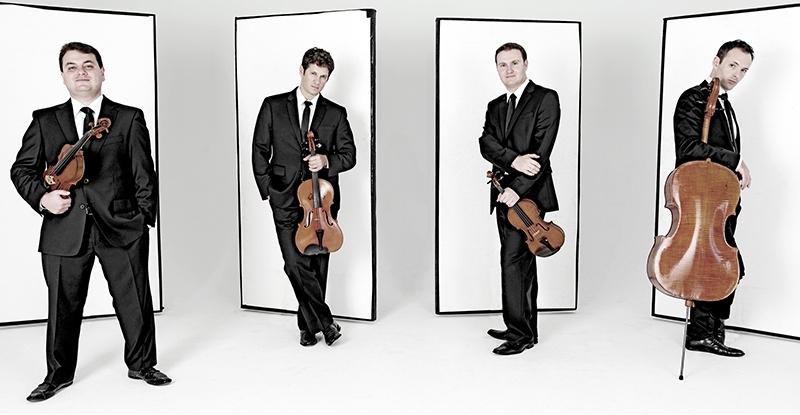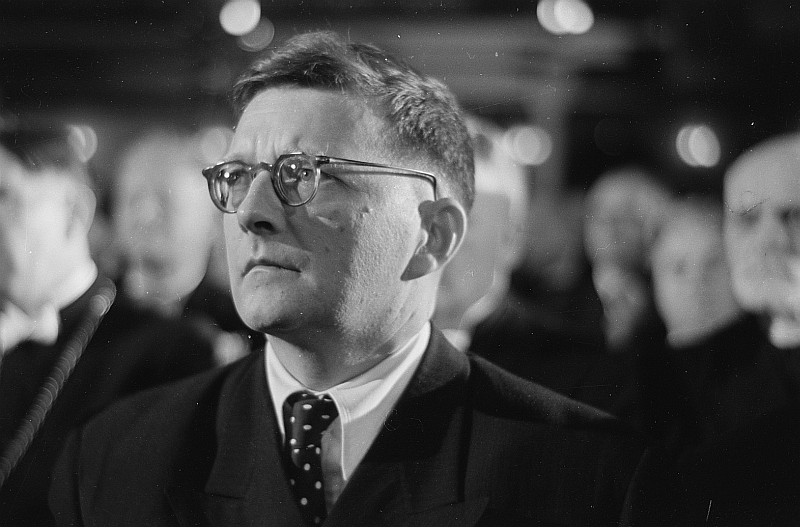Shostakovich Cycle, Jerusalem Quartet, Wigmore Hall | reviews, news & interviews
Shostakovich Cycle, Jerusalem Quartet, Wigmore Hall
Shostakovich Cycle, Jerusalem Quartet, Wigmore Hall
Peerless playing of three great quartets from one of the world's finest foursomes

Under what circumstances can Shostakovich’s Eighth String Quartet, the most (over)played of the 15, sound both as harrowing as it possibly can be and absolutely fresh? Well, the context helps: hearing it at the breaking heart of the fourth concert in the Jerusalem Quartet’s Shostakovich cycle gave it extra resonance with the works on either side of it.
The evening’s trilogy explored an explicitly personal note in Shostakovich’s interlinked quartet chronicle. The elliptical Seventh is dedicated to the memory of first wife Nina, who would have been 50 in 1960; Shostakovich, pictured below at a Bach festival in east Germany, where a bombed Dresden was supposed to be the inspiration for the Eighth, revealed it to his close musical friend Isaak Glikman, with a curious mixture of irony and evasiveness, as a “pseudo-tragedy" dedicated "to the memory of the composer"; and the Ninth, the dedicatee of which is wife no. 3, Irina, who still guards her husband’s memory, ends with a rollicking, savage celebration of a frequent guest at Shostakovich’s table, the “blue-note” theme from the finale of his pupil Galina Ustvolskaya’s Trio for Violin, Clarinet and Piano.
 It was a much needed emancipation at the end of a rigorous and exhausting programme. As in Shostakovich’s writing for specific original performers, personalities were paramount, but none dominated. First violinist Alexander Pavlovsky flicked the quizzical little phrase at the start of the Seventh deftly into life, with impeccable judgment for the right length of pauses and silences, while viola player Ori Kam dug furiously into the whirlwind that kicks off the finale – another variation on the composer’s personal monogram D.SCH (the German transliteration of his initial and the first three letters of his surname, with German letters Es for E flat, and H for B).
It was a much needed emancipation at the end of a rigorous and exhausting programme. As in Shostakovich’s writing for specific original performers, personalities were paramount, but none dominated. First violinist Alexander Pavlovsky flicked the quizzical little phrase at the start of the Seventh deftly into life, with impeccable judgment for the right length of pauses and silences, while viola player Ori Kam dug furiously into the whirlwind that kicks off the finale – another variation on the composer’s personal monogram D.SCH (the German transliteration of his initial and the first three letters of his surname, with German letters Es for E flat, and H for B).
Part of the great pleasure for any newcomer must be to watch the keen interaction of the players – the way that second violinist Sergei Bresler smiled so warmly at his colleague each time an unexpected F sharp major, Shostakovich’s “love key”, brought a movement to a close, the physicality that sometimes bounces Pavolvsky out of his seat, the way that infinitely sensitive cellist Kyril Zlotnikov leans to players on his right and left.
Has there ever been a fiercer delivery of the Eighth's first infernal scherzo?
It was Zlotnikov’s delivery of the theme from Lady Macbeth of Mtsensk quoted in the great fourth-movement Largo of the Eighth Quartet, paralleling heroine Katerina’s desperate tenderness on the road to Siberia with the composer’s own remembrance of happiness in misery, that brought tears most readily to the eyes. But they were never far away in the quartet’s infinite probing of the variations Shostakovich gets from his D.SCH motto in a work built almost entirely on that and other self-quotations. And has there ever been a fiercer delivery of the first infernal scherzo? Its two plunges into the Jewish melody of the Second Piano Trio was absolutely hair-raising.
Temperatures could afford to be a little lower at first for the Ninth’s equivocal first movement. But again there was deep pathos in the first of the two slow movements as well as new notes in the acid pizzicato and note-row solos of the second, and the control of the vast finale was, again, both rigorous and ultimately exhilarating. That decided me: much as I’d love to hear Iestyn Davies with the Aurora Orchestra tonight, the second instalment has to take priority. So it’s back to the Wigmore Hall for what I don’t doubt will be a third five-star event in less than a week.
rating
Buy
Share this article
The future of Arts Journalism
You can stop theartsdesk.com closing!
We urgently need financing to survive. Our fundraising drive has thus far raised £33,000 but we need to reach £100,000 or we will be forced to close. Please contribute here: https://gofund.me/c3f6033d
And if you can forward this information to anyone who might assist, we’d be grateful.

Subscribe to theartsdesk.com
Thank you for continuing to read our work on theartsdesk.com. For unlimited access to every article in its entirety, including our archive of more than 15,000 pieces, we're asking for £5 per month or £40 per year. We feel it's a very good deal, and hope you do too.
To take a subscription now simply click here.
And if you're looking for that extra gift for a friend or family member, why not treat them to a theartsdesk.com gift subscription?
more Classical music
 Goldberg Variations, Ólafsson, Wigmore Hall review - Bach in the shadow of Beethoven
Late changes, and new dramas, from the Icelandic superstar
Goldberg Variations, Ólafsson, Wigmore Hall review - Bach in the shadow of Beethoven
Late changes, and new dramas, from the Icelandic superstar
 Mahler's Ninth, BBC Philharmonic, Gamzou, Bridgewater Hall, Manchester review - vision and intensity
A composer-conductor interprets the last completed symphony in breathtaking style
Mahler's Ninth, BBC Philharmonic, Gamzou, Bridgewater Hall, Manchester review - vision and intensity
A composer-conductor interprets the last completed symphony in breathtaking style
 St Matthew Passion, Dunedin Consort, Butt, Queen’s Hall, Edinburgh review - life, meaning and depth
Annual Scottish airing is crowned by grounded conducting and Ashley Riches’ Christ
St Matthew Passion, Dunedin Consort, Butt, Queen’s Hall, Edinburgh review - life, meaning and depth
Annual Scottish airing is crowned by grounded conducting and Ashley Riches’ Christ
 St Matthew Passion, Irish Baroque Orchestra, Whelan, St Patrick’s Cathedral, Dublin review - the heights rescaled
Helen Charlston and Nicholas Mulroy join the lineup in the best Bach anywhere
St Matthew Passion, Irish Baroque Orchestra, Whelan, St Patrick’s Cathedral, Dublin review - the heights rescaled
Helen Charlston and Nicholas Mulroy join the lineup in the best Bach anywhere
 Kraggerud, Irish Chamber Orchestra, RIAM Dublin review - stomping, dancing, magical Vivaldi plus
Norwegian violinist and composer gives a perfect programme with vivacious accomplices
Kraggerud, Irish Chamber Orchestra, RIAM Dublin review - stomping, dancing, magical Vivaldi plus
Norwegian violinist and composer gives a perfect programme with vivacious accomplices
 Small, Hallé, Wong, Bridgewater Hall, Manchester review - return to Shostakovich’s ambiguous triumphalism
Illumination from a conductor with his own signature
Small, Hallé, Wong, Bridgewater Hall, Manchester review - return to Shostakovich’s ambiguous triumphalism
Illumination from a conductor with his own signature
 LSO, Noseda, Barbican review - Half Six shake-up
Principal guest conductor is adrenalin-charged in presentation of a Prokofiev monster
LSO, Noseda, Barbican review - Half Six shake-up
Principal guest conductor is adrenalin-charged in presentation of a Prokofiev monster
 Frang, LPO, Jurowski, RFH review - every beauty revealed
Schumann rarity equals Beethoven and Schubert in perfectly executed programme
Frang, LPO, Jurowski, RFH review - every beauty revealed
Schumann rarity equals Beethoven and Schubert in perfectly executed programme
 Levit, Sternath, Wigmore Hall review - pushing the boundaries in Prokofiev and Shostakovich
Master pianist shines the spotlight on star protégé in another unique programme
Levit, Sternath, Wigmore Hall review - pushing the boundaries in Prokofiev and Shostakovich
Master pianist shines the spotlight on star protégé in another unique programme
 Classical CDs: Big bands, beasts and birdcalls
Italian songs, Viennese chamber music and an enterprising guitar quartet
Classical CDs: Big bands, beasts and birdcalls
Italian songs, Viennese chamber music and an enterprising guitar quartet
 Connolly, BBC Philharmonic, Paterson, Bridgewater Hall, Manchester review - a journey through French splendours
Magic in lesser-known works of Duruflé and Chausson
Connolly, BBC Philharmonic, Paterson, Bridgewater Hall, Manchester review - a journey through French splendours
Magic in lesser-known works of Duruflé and Chausson
 Biss, National Symphony Orchestra, Kuokman, NCH Dublin review - full house goes wild for vivid epics
Passionate and precise playing of Brahms and Berlioz under a dancing master
Biss, National Symphony Orchestra, Kuokman, NCH Dublin review - full house goes wild for vivid epics
Passionate and precise playing of Brahms and Berlioz under a dancing master

Add comment